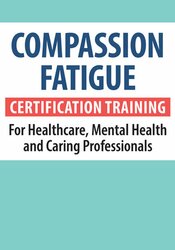

Compassion is at the heart of your work, and at the heart of you. But excessive demands on your empathy can leave you feeling worn down, burdened by the suffering of others, and dreading your next day on the job.
This is Compassion Fatigue. It’s more than being overworked, and it’s a threat to the safety of your patients, your own wellbeing, your relationships, and your career.
This program is exactly what you need to regain purpose, fulfilment, and thrive in your profession – whether you’re already experiencing the emotional burnout of Compassion Fatigue, or want to make sure you avoid it.
If you work in healthcare, mental health, veterinary medicine, rehab or any helping profession this is one recording you can’t afford to miss.
Become Certified!
By completing this program you will have met the educational requirements for eligibility when applying to become a Certified Compassion Fatigue Professional (CCFP) through the International Association of Trauma Professionals! Seize the opportunity to become a go-to resource in your facility, office, or unit with the tools and understanding necessary to manage the emotional demands that can negatively impact the care of patients/clients and push other valuable team members away from the job
Please Note: Professional standards apply. The IATP has an application fee for the CCFP certification; that fee is not included in your program purchase. Visit traumapro.net/customercare/faq for answers to frequently asked certification questions.
| File type | File name | Number of pages | |
|---|---|---|---|
| Manual - Compassion Fatigue (42.5 MB) | 86 Pages | Available after Purchase |

Debra Premashakti Alvis, PhD, a licensed psychologist, developed the Mind/Body Program at the University of Georgia, providing clinician training on the integration of mindfulness and contemplative practices into psychotherapy. Her work as a professor at the University of Georgia included the supervision of doctoral students and co-leading a research team investigating mindfulness.
In addition to teaching, Dr. Alvis maintains a private practice and has more than 25 years of clinical experience in treating clients with a variety of conditions by mindfulness principles, body-oriented principles and traditional psychotherapeutic approaches. She also has an over 30-year personal contemplative practice.
Speaker Disclosures:
|
Compassion Fatigue Certification Training for Healthcare, Mental Health and Caring Professionals
Copyright: 14/07/2022 - Product Code POS055855 |
Please wait ...